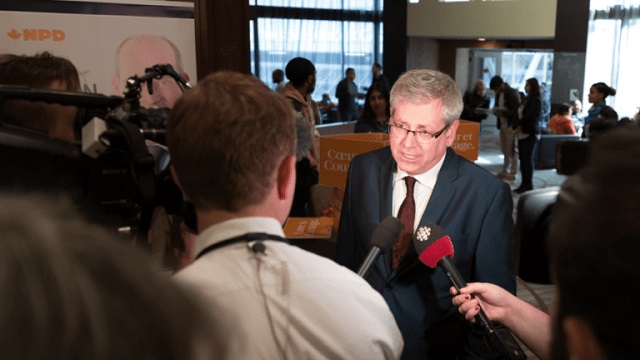Energy
Proposed ban on oil and gas promotion revives paternalistic treatment of Indigenous peoples

From the Macdonald Laurier Institute
By Karen Ogen-Toews
MP Charlie Angus needs to withdraw his offensive attempt to silence discussion and apologize.
First Nations are used to oppression. We lived for over a century with the heavy hand of the Department of Indian Affairs. We coped with bossy and even mean Indian agents. The government of Canada told us where to live, how to learn, tried to destroy our language and culture, and undermined our traditional economies.
We are sick and tired of being told what to do and think. We can do these things for ourselves. But First Nations know that paternalism is far from dead in Canada.
With his private member’s bill banning promotion of the oil and gas industry, Charlie Angus wants to bring back the oppressive hand of the state in a manner consistent with dictatorships and authoritarian states. The NDP MP for Timmins-James Bay and his party want to shut down fossil fuel production, a move that would devastate the Canadian economy and undermine the greatest — and often the only — opportunity that many First Nations have for economic renewal.
Even that is not enough. He wants to shut us up, telling us what to think and threatening us with jail and fines for not adhering to his strange, unrealistic and dangerous views of energy and environmental protection.
I am a proud spokesperson for First Nations engagement with the LNG sector. My First Nation, the Wet’suwet’en, has been on the front lines of the national debate about LNG and pipeline construction.
We have lived for years with the national media misrepresenting and distorting our community’s views on the Coast Gas Link Pipeline, a major resource project that now has significant First Nations ownership. This project has overwhelming support in my First Nation, not an impression one would get from the media coverage of the environmentalists’ interventions in community affairs.
Coastal Gas Link has already brought well-paid jobs, business opportunities and new financial resources to our people and it will do so for decades to come.
We have monitored the project closely and continue to work with the pipeline company to ensure the environment is protected and our interests respected.
At the First Nations LNG Alliance, we spent years exploring the global environmental impact of liquified natural gas. We know that Canadian LNG, produced to the highest international environmental standards, will allow Asian countries to cut back sharply on coal usage, a process with as much ecological benefit as many of the symbolic steps being taken in Canada and other nations.
It is so tragic that the Canadian discussion about energy and climate change has been reduced to trite phrases, simple concepts and now the unleashing of the authoritarian impulses that remain in the country.
I am confident that many First Nations have spent much more time exploring and debating energy production and use than most Canadian communities. Finding the balance between economic development, local environmental and cultural protection and ecological sustainability is hard work. Our communities discuss energy and infrastructure issues all the time, and we are comfortable with the decisions we have made.
A long-serving member of Parliament, Angus now wants to shut me up. He wants to fine me or put me in jail for doing my job and for presenting First Nations perspectives on fossil fuels. He wants to ban public discussion of oil and gas and has clearly bought into the idea that fossil fuels should be eliminated.
We have no idea about the future that Angus and others have in mind. Perhaps he envisages a country with homes heated by good will, transportation restricted to foot and bicycle, food transported by pack dogs, car-free roads paved only with good intentions and government budgets funded by best wishes.
Many odd and unexpected things come out of the House of Commons, but nothing in recent years is as upsetting and disgraceful as Angus’s private member’s bill, C-372.
So, I say this: Mr. Angus, you have gone much too far. Your private member’s bill is the most ridiculous, paternalistic and reprehensible example of oppression directed at First Nations people in decades. I hope you are embarrassed by your ideological over-reach, and I hope you have the decency to withdraw your bill and apologize.
You insulted Canadians and offended the hundreds of Indigenous communities and thousands of First Nations people actively engaged in the oil and gas sector.
We will not be quiet as we chart the future we want, on our terms and in our territories. Far from silencing us, you have made it abundantly clear that Indigenous peoples must speak for ourselves. Most importantly, we will fight to protect ourselves from the old-style paternalism that lurks way too close to the surface in Canadian public affairs.
Karen Ogen-Toews is the CEO of the First Nations LNG Alliance
Daily Caller
AI Needs Natural Gas To Survive


From the Daily Caller News Foundation
By David Blackmon
As recent studies project a big rise in power generation demand from the big datacenters that are proliferating around the United States, the big question continues to focus in on what forms of generation will rise to meet the new demand. Most datacenters have plans to initially interconnect into local power grids, but the sheer magnitude of their energy needs threatens to outstrip the ability of grid managers to expand supply fast enough.
This hunger for more affordable, 24/7 baseload capacity is leading to a variety of proposed solutions, including President Donald Trump’s new executive orders focused on reviving the nation’s coal industry, scheduled to be signed Tuesday afternoon. But efforts to restart the permitting of new coal-fired power plants in the US will require additional policy changes, efforts which will take time and could ultimately fail. In the meantime, datacenter developers find themselves having to delay construction and completion dates until firm power supply can be secured.
Datacenters specific to AI technology require ever-increasing power loads. For instance, a single AI query can consume nearly ten times the power of a traditional internet search, and projections suggest that U.S. data center electricity consumption could double or even triple by 2030, rising from about 4-5% of total U.S. electricity today to as much as 9-12%. Globally, data centers could see usage climb from around 536 terawatt-hours (TWh) in 2025 to over 1,000 TWh by 2030. In January, a report from the American Security Project estimated that datacenters could consume about 12% of all U.S. power supply.
Obviously, the situation calls for innovative solutions. A pair of big players in the natural gas industry, Liberty Energy and Range Resources, announced on April 8 plans to diversify into the power generation business with the development of a major new natural gas power plant to be located in the Pittsburgh area. Partnering with Imperial Land Corporation (ILC), Liberty and Range will locate the major power generation plant in the Fort Cherry Development District, a Class A industrial park being developed by ILC.
“The strategic collaboration between Liberty, ILC, and Range will focus on a dedicated power generation facility tailored to meet the energy demands of data centers, industrial facilities, and other high-energy-use businesses in Pennsylvania,” the companies said in a joint release.
Plans for this new natural gas power project follows closely on the heels of the March 22 announcement for plans to transform the largest coal-fired power plant in Pennsylvania, the Homer City generating station, into a new gas-fired facility. The planned revitalized plant would house 7 natural gas turbines with a combined capacity of 4.5 GW, enough power 3 million homes.
Both the Homer City station and the Fort Cherry plant will use gas produced out of the Appalachia region’s massive Marcellus Shale formation, the most prolific gas basin in North America. But plans like these by gas companies to invest in their own products for power needs aren’t isolated to Pennsylvania.
In late January, big Permian Basin oil and gas producer Diamondback Energy told investors that it is seeking equity partners to develop a major gas-fired plan on its own acreage in the region. The facility would primarily supply electricity to data centers, which are expected to proliferate in Texas due to the AI boom, while also providing power for Diamondback’s own field operations. This dual-purpose approach could lower the company’s power costs and create a new revenue stream by selling excess electricity.
Prospects for expansion of gas generation in the U.S. received a big boost in January when GE Vernova announced plans for a $600 million expansion of its manufacturing capacity for gas turbines and other products in the U.S. GE Vernova is the main supplier of turbines for U.S. power generation needs. The company plans to build 37 gas power turbines in 2025, with a potential increase to over 70 by 2027, to meet rising energy demands.
The bottom line on these and other recent events is this: Natural gas is quickly becoming the power generation fuel of choice to feed the needs of the expanding datacenter industry through 2035, and potentially beyond. Given that reality, the smart thing to do for these and other companies in the natural gas business is to put down big bets on themselves.
David Blackmon is an energy writer and consultant based in Texas. He spent 40 years in the oil and gas business, where he specialized in public policy and communications.
Bjorn Lomborg
The stupidity of Net Zero | Bjorn Lomborg on how climate alarmism leads to economic crisis

From spiked on YouTube
Note: This interview is focused on Europe and the UK. It very much applies to Canada. The 2025 Federal Election which will see Canadians choose between a more common sense approach, and spending the next 4 years continuing down the path of pursuing “The Stupidity of Net Zero”.
European industry is in freefall, and Net Zero is to blame.
Here, climate economist Bjorn Lomborg – author of Best Things First and False Alarm – explains how panic over climate change is doing far more damage than climate change itself. Swapping cheap and dependable fossil fuels for unreliable and expensive renewables costs our economies trillions, but for little environmental gain, Lomborg says.
Plus, he tackles the myth of the ‘climate apocalypse’ and explains why there are more polar bears than ever.
Support spiked: https://www.spiked-online.com/support/
Sign up to spiked’s newsletters: https://www.spiked-online.com/newslet…
-

 Business2 days ago
Business2 days agoStocks soar after Trump suspends tariffs
-

 COVID-192 days ago
COVID-192 days agoBiden Admin concealed report on earliest COVID cases from 2019
-

 Business2 days ago
Business2 days agoScott Bessent Says Trump’s Goal Was Always To Get Trading Partners To Table After Major Pause Announcement
-

 2025 Federal Election1 day ago
2025 Federal Election1 day agoResearchers Link China’s Intelligence and Elite Influence Arms to B.C. Government, Liberal Party, and Trudeau-Appointed Senator
-

 Business1 day ago
Business1 day agoTimeline: Panama Canal Politics, Policy, and Tensions
-

 COVID-191 day ago
COVID-191 day agoFauci, top COVID officials have criminal referral requests filed against them in 7 states
-

 2025 Federal Election2 days ago
2025 Federal Election2 days agoRCMP memo warns of Chinese interference on Canadian university campuses to affect election
-

 2025 Federal Election2 days ago
2025 Federal Election2 days agoThe status quo in Canadian politics isn’t sustainable for national unity





